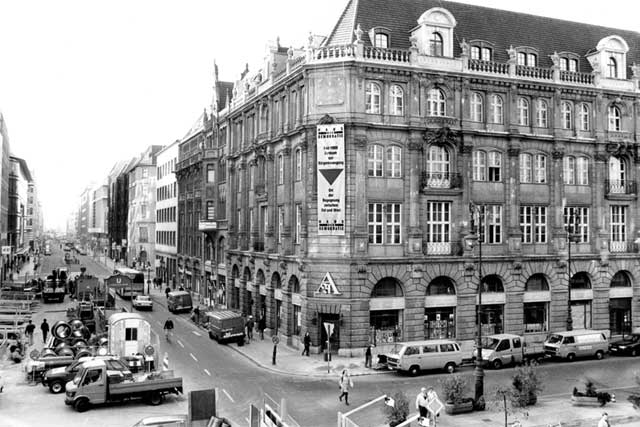Following the history of the House of Democracy and Human Rights the contribution "House of Democracy - Monument and Signal" by Dr. Wolfgang Ullmann:

The citizens' movements of the peaceful revolution of autumn 1989 are represented in the German public by three legacies: the draft constitution of the Central Round Table, the House of Democracy and last but not least the symbolic value of the name Bündnis 90/Die Grünen.
Even though the names "Bündnis 90" and "Die Grünen" by far do not cover the entire spectrum of the organisations represented in the House of Democracy, one thing is expressed in their combination: the aim of the citizen movement is not to artificially prolong its special and parallel existence caused by the circumstances of autumn 1989, but to participate together and in new structures in the political discourse in the new all-German democracy in order to intervene in it with their experiences.
Under pressure from the major West German parties, the draft constitution of the Central Round Table was not able to play the role in the unification process it was intended to play. But it is precisely for this reason that this draft constitution with its Article 132, which refers to the German unification process under Article 23 of the Basic Law, is a permanent monument to the democratic deficits of a purely administrative unification process that was carried out via a monetary union. For the same reason, this draft constitution became the stimulus for the first all-German citizens' movement, the Kuratorium für einen "demokratisch verfassten Bund deutscher Länder" (Board of Trustees for a "democratically constituted federation of German Länder"), founded in June 1990.
The House of Democracy, on the other hand, is a monument to the fact that autumn 1989, which culminated in the convening of the Central Round Table on 7 December 1989, was a real revolution. His decision at the first meeting not to transform the Ministry of State Security into an "Office for National Security", but to dissolve it at all, made it clear that the power structures of the SED should be broken and not only reformed - as in the case of the transformation of the SED into the PDS.
After all, the party still operating under the name SED/PDS at that time was prepared to acknowledge the revolutionary situation at least to the extent that it reacted to the decision of the Round Table that the new citizen movements should be equipped with a minimum of spatial and technical working possibilities: Following a corresponding decision by the GDR Council of Ministers, it made the house of the SED district leadership in Berlin-Mitte available to the citizens' movements for their work.
Thus the "Initiative for Peace and Human Rights", the "New Forum", "Democracy Now", the "Democratic Awakening", the "Green League", the "Green Party", the "United Left" and many others were able to set up offices there from which they could coordinate their work, produce publications and carry out their public relations work at all.
A first highlight of these activities was the negotiations on the Modrow government's proposal to form a "government of national responsibility" consisting of citizens' movements and the bloc parties represented in the GDR Council of Ministers. Negotiations which took place at the end of January 1990 in the House of Democracy with the participation of the representatives of the Eastern SPD ("SDP"), before the latter separated from the electoral alliance formed in October 1989 with a view to the People's Chamber elections in the spring of 1990.
The House of Democracy was the only material basis with which the citizens' movements could enter the election campaign - against the overwhelming competition of the West German parties that stood behind their East German counterparts - including the SDP, which in the meantime had opened up to the Western "big party" by adapting its name.
The poor performance in this election was also due to this imbalance of power. But it also proved that the importance of citizen movements must not first be measured by electoral success. As local and temporary initiatives, they need an institution that functions differently from a party headquarters. They need a stable free space for encounters, where discourse and communication are not subject to the prevailing opinion and media cycles, nor to the calendar of election periods.
This is exactly what the House of Democracy wants to be. By taking up the name of the New Forum, the largest citizens' movement of autumn 1989, one could say that the House of Democracy is the other forum, the forum for forming opinions in the non-party and inter-party space, which proved to be the politically decisive one that autumn. Such an exceptional situation cannot be artificially conceded unlimited duration, as some exponents of the civil movement still seem to have in mind. But even in our public sphere, which is characterized by party dominance, democracy needs spaces of relaxation and undisturbed communication, where neither the marketing and quota interests of the media industry nor the unrestrained nature of the regulars' emotions can influence or even prevent the conversations of committed citizens.
The extent to which the commitment to such a House of Democracy is also a matter of public political morality is demonstrated by the fact that it is still possible in the Federal Republic of Germany to assert restitution claims in favour of the successor companies of the Hermann-Göring-Werke against the citizens' movements without having to fear public branding. Seen in this light, the existence of the House of Democracy is also a constant reminder of the necessary priority of the human and civil rights of all, and thus also of the historical points of reference of this democracy vis-à-vis the ownership interests of individuals, ownership interests which, in the case of the House of Democracy, are, moreover, historically and publicly discredited. Because "house of democracy" - that always means house of the history of this democracy.
